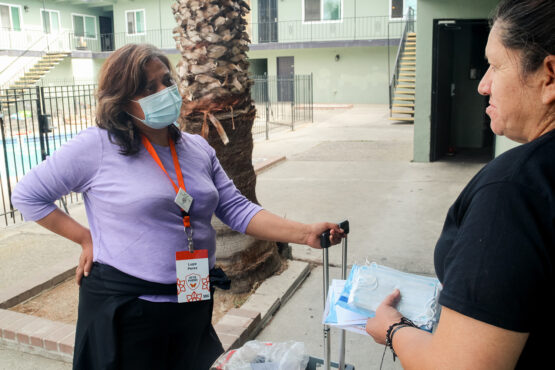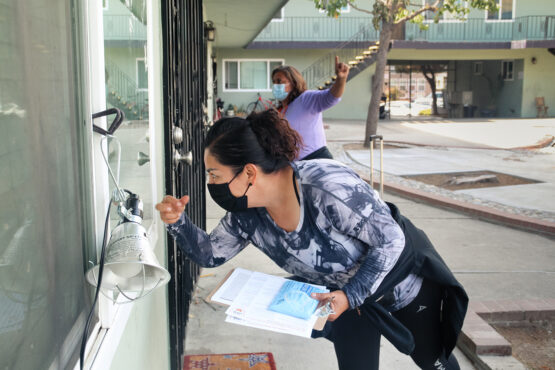Stanford supports community health workers conducting COVID-19 vaccine outreach in area’s Latinx community
Stanford faculty members are collaborating with community health workers to promote COVID-19 vaccine awareness and public health guidelines in the area’s Latinx community. The outreach effort is one of eight faculty-led projects addressing pandemic-related impacts chosen this year to receive funding from the university’s Office of Community Engagement.
Editor’s Note: To read this story in Spanish, click here.
Early one Saturday, two women pulled a heavy cart full of informational flyers, blue face masks and iPads into a light green apartment complex in East San Jose and began tapping on metal screen doors.
Go to the web site to view the video.
If someone answered, they began a conversation about the COVID-19 vaccine. Every week, the community health workers, or promotoras de salud, initiate these conversations on the doorsteps of homes, outside stores and at events. They are part of a project led by Stanford faculty members Patricia Rodriguez Espinosa and Lisa Goldman Rosas, in collaboration with the ¡Sí Se Puede! Collective, to promote COVID-19 vaccine awareness and public health guidelines in the area’s Latinx community.
“It’s having the opportunity to talk and help someone when they don’t know you or probably will never see you again. That’s something every human should experience. It’s beautiful,” said Angelica Flores, promotora and co-founder of De Colores C. Consulting LLC, which provides services such as mentorship, technology workshops and program development to East San Jose’s Latinx community.
The outreach effort is one of eight faculty-led projects addressing pandemic-related impacts chosen this year to receive funding from the university’s Office of Community Engagement (OCE). The OCE funding offers a quick infusion of money to accelerate faculty’s work centered on the community.
Rodriguez Espinosa is the associate director of research in the Office of Community Engagement within the School of Medicine and an instructor in the Department of Epidemiology and Population Health. Goldman Rosas is an assistant professor in the Department of Epidemiology and Population Health and the Department of Medicine and faculty director of the Office of Community Engagement within the School of Medicine.
Their project with the ¡Sí Se Puede! Collective provides resources, training and capacity building for the promotoras in Santa Clara and San Mateo counties. It also supports creation and access to culturally and linguistically appropriate, evidence-based outreach materials addressing COVID-19 misinformation in the Latinx community.
Since May, the funding has primarily been used to support the promotoras in attending capacity development training, co-developing materials and conducting additional community outreach, which can be “incredibly time consuming,” said Rodriguez Espinosa. “Providing the financial resources not only incentivizes participation but it allows the time to fully engage and honors community partners’ time and expertise.”

Lupe Perez, a community health worker, speaks with San Jose resident Maria Madrid about the COVID-19 vaccine on Sept. 18, 2021. (Image credit: Chelcey Adami)
At the project’s onset, the promotoras, who are often experiencing their own stress related to the pandemic, expressed the need for additional training to adequately respond to community members facing similar pressures, Rodriguez Espinosa said.
“They wanted skills around practicing self-care, preventing burnout in their profession and enhancing their ability to be present in their interactions with community members,” Rodriguez Espinosa said. “They’re working with community members who are facing eviction, food and economic insecurity. Balancing all those demands while addressing vaccine-related conversations is challenging.”
Motivational interview training, adapted for having conversations around vaccine confidence, has been particularly impactful, Flores said. It’s an evidence-based conversation technique that creates a safe space for those who are contemplating or ambivalent about a behavioral change – such as quitting smoking – to explore their reasons for change and highlights conflict between values and behavior.
“It has launched me to the next level when facing these conversations,” Flores said. “The most important thing is not to make the (vaccine) appointment but to listen and provide them with resources or information to keep them motivated.”
“Community members feel a bit more relaxed when they realize it’s not somebody pushing a vaccine on them but a person willing to hear their concerns,” Rodriguez Espinosa said.
The group tracks key concerns of community members, particularly Spanish speakers and Latinx adults. Some cite confusion over changing medical guidance, aren’t clear what the differences are between the vaccines available or don’t know where to get one. Others voice concern about what’s in the vaccine, whether it has been adequately tested or if people can trust government agencies. Others cite their religion as a reason for not getting the vaccine, and some don’t have a reason, Flores said.
The promotoras answer questions, provide information and share their phone number in case community members want to speak further.
Sometimes they hear back from community members who say they thought more about the conversation and now a family member would like to speak with them, Flores said. At times, a person agrees to get a vaccine, and it results in the whole household getting vaccinated.

Community health workers Celia Prado (front) and Lupe Perez knock on doors in East San Jose while doing COVID vaccine outreach Sept. 18, 2021. (Image credit: Chelcey Adami)
Some promotoras speak with 20 to 25 people a week while others talk to 100, depending on the conversation setting. Door-to-door outreach, often done in ZIP codes hardest hit by COVID-19, usually proves more time-intensive, sometimes including an hour-long conversation with one person.
About 90 percent of the people the promotoras speak with are immigrants, Flores said.
“There are a lot of people who don’t speak any English, and they don’t have a smartphone. They don’t know there are resources,” Flores said. “They don’t know how to fill out an application or how to dial a number on the phone. The gratitude is on their faces when we do one small thing. They say, ‘You saved my life.’ ”
After applying their new skills in the field, the promotoras report back what they’re hearing in terms of concerns, mis- or disinformation or new questions such as vaccines for children. This allows Rodriguez Espinosa and her colleagues to develop new materials and stay current on the community’s priorities, “not just responding to the most recent COVID crisis,” she said.
It also helps to ensure the promotoras have materials on that topic available in Spanish.
This sometimes involves drawing on their access to those doing similar work nationwide as part of their work within the National Institutes of Health Community Engagement Alliance and the Share, Trust, Organize, Partner: The COVID-19 California Alliance to find materials that may have already been developed on a certain topic.
“Especially with rapid changes in scientific guidelines in COVID, having support is very helpful,” Rodriguez Espinosa said. “We’re constantly learning something new about COVID and responding to changing needs in the community, so we have to be flexible.”
Rodriguez Espinosa believes that this project, which continues through December, could serve as a model for future health engagement work to address other issues in the Latinx community including chronic conditions, cancer disparities and others.
For Flores, “I feel like this pandemic left us very vulnerable and open to connect and to talk and to share,” she said. “We are built to connect and love every human, and I feel this pandemic has brought those things back in some way.”
